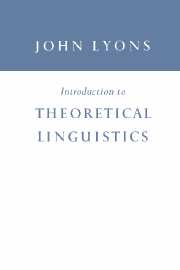Book contents
- Frontmatter
- Contents
- PREFACE TO THE 1995 EDITION
- 1 Linguistics: The Scientific Study of Language
- 2 The Structure of Language
- 3 The Sounds of Language
- 4 Grammar: General Principles
- 5 Grammatical Units
- 6 Grammatical Structure
- 7 Grammatical Categories
- 8 Grammatical Functions
- 9 Semantics: General Principles
- 10 Semantic Structure
- Notes and references
- Addenda
- Bibliography
- Table of symbols and notational conventions
- Index of proper names
- Index of subjects
9 - Semantics: General Principles
Published online by Cambridge University Press: 05 June 2012
- Frontmatter
- Contents
- PREFACE TO THE 1995 EDITION
- 1 Linguistics: The Scientific Study of Language
- 2 The Structure of Language
- 3 The Sounds of Language
- 4 Grammar: General Principles
- 5 Grammatical Units
- 6 Grammatical Structure
- 7 Grammatical Categories
- 8 Grammatical Functions
- 9 Semantics: General Principles
- 10 Semantic Structure
- Notes and references
- Addenda
- Bibliography
- Table of symbols and notational conventions
- Index of proper names
- Index of subjects
Summary
Introductory
The term ‘semantics’
Semantics may be defined, initially and provisionally, as ‘the study of meaning’. The term ‘semantics’ is of relatively recent origin, being coined in the late nineteenth century from a Greek verb meaning ‘to signify’. This does not mean, of course, that scholars first turned their attention to the investigation of the meaning of words less than a hundred years ago. On the contrary, from the earliest times down to the present day grammarians have been interested in the meaning of words, and frequently more interested in what words mean than in their syntactic function. A practical manifestation of this interest is seen in the innumerable dictionaries that have been produced throughout the ages, not only in the West, but in all parts of the world where language has been studied. As we have already seen, the categories of traditional grammar were to a large extent determined by their characteristic ‘modes of signifying’ (cf. 1.2.7).
Neglect of semantics in modern linguistics
Many of the more influential books on linguistics that have appeared in the last thirty years devote little or no attention to semantics. The reason for this is that many linguists have come to doubt whether meaning can be studied as objectively and as rigorously as grammar and phonology, for the present at least.
- Type
- Chapter
- Information
- Introduction to Theoretical Linguistics , pp. 400 - 442Publisher: Cambridge University PressPrint publication year: 1968

